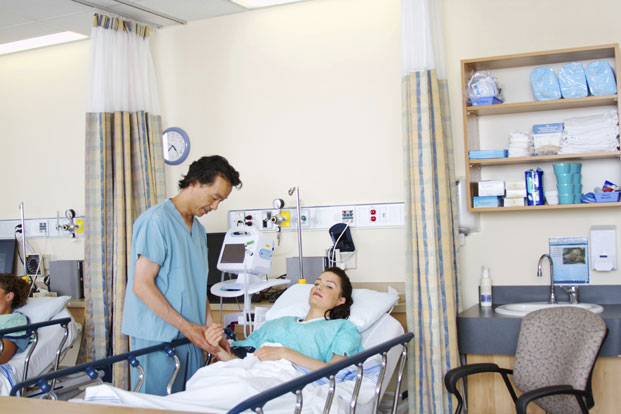Imagine that you underwent a medical procedure at your local hospital. Shortly after the procedure, you began feeling extremely ill with a high temperature and a bad headache. However, when you informed doctors of your condition, they just responded by saying it’s probably a bug and told you to see if it improves by your post-operation appointment. Unfortunately, your condition did not improve, and you called the hospital hotline only three days later, worried that something very serious was going on.
Then, when you turned up at the hospital again, the staff did not seem worried about your condition and denied that your procedure had anything to do with it. After being bounced around to a chiropractor, a couple different hospitals and a few doctors, it was finally discovered that you had an infection caused by your surgical procedure. This is exactly what happened to a woman in California. Sadly, she had to spend two weeks in the hospital while she was treated for Strep group B infection from an abscess at the surgical site.
If you think hospital infections, or nosocomial infections, are uncommon in the United States, you have been misinformed. In fact, several news outlets reported recently on the frequency of hospital infections in the U.S. Consequently, the Centers for Disease Control and Prevention, or CDC, estimate that one in 25 hospital patients develops hospital infections. Startlingly, that means more than 600,000 people are afflicted each year with hospital infections. Of that 600,000 people, 75,000 people fight more than one hospital infection at a time.
To lower the risk of hospital infection, it is extremely important that patients know what they are, how they are acquired and who is at risk. Without this information, you could be increasing your risk for hospital infections every time you are admitted to the hospital. The information below can help you get the knowledge you need to protect yourself from hospital infections.
What is a hospital infection?
You went to the hospital to get better — it can’t make you worse, right? Unfortunately, that is not the case, mostly due to hospital infections. Although many people are unaware of the dangers associated with hospital infections, countless people are affected by them. A hospital infection is often caused by pathogens found on invasive medical devices such as ventilators and catheters. On the whole, hospital infections include central line-associated bloodstream infections, catheter-associated urinary tract infections, surgical-site infections and ventilator-associated pneumonia.
According to the CDC, hospital-acquired infections are preventable. For starters, doctors, nurses and patients should wash their hands as frequently as possible. In addition, there is growing advocacy for screening patients for germs that could become hospital-transmitted infections. Several states are considering legislation requiring such screening of patients as they are admitted to the hospital to prevent the spread of hospital infections.
How is a hospital infection acquired?
Specifically, central-line bloodstream infections occur when germs like bacteria or viruses enter the bloodstream through a central line. A central line is a catheter tube that has been placed in a main vein in the neck, chest or groin to administer medications or food. Many patients will receive a central line catheter during their stay at the hospital.
Likewise, about 15 to 25 percent of people admitted to the hospital receive a urinary catheter. Of that percentage, nearly 75 percent of patients with a catheter contract a urinary tract infection while in the hospital. Similar to a central line bloodstream infection, a catheter-related urinary tract infection occurs when germs enter the urinary tract. Usually, the infection starts upon catheter insertion or while it sits in the bladder.
Similarly, a surgical-site infection occurs where the surgery has taken place and is caused by germs entering the surgical area. Sometimes, a surgical site infection can be on the skin, and other times it can be internal, in places like the organs and implanted materials. Surgical-site infections are one of the most dangerous types of hospital infections because recovery can be inhibited as the body fights an infection while healing.
Ventilator-associated pneumonia develops in the lungs and occurs when germs enter the ventilator, causing sickness. Because a ventilator tube is necessary to help certain patients breathe, ventilator-related Pneumonia is rather serious. Just like the other three infection types, ventilator-associated pneumonia is treated with antibiotics.
Who is at risk for a hospital infection?
With so many hospital infections occurring each year in the U.S., you may be concerned about your risk for hospital infections, especially if you are going to be or have been admitted to a hospital. Additional worry might occur if you have had a central line or urinary catheter, surgery or a ventilator while you were in the hospital. Commonly, every patient admitted to the hospital has the chance of contracting a hospital infection.
However, patients in the intensive care unit have a higher probability of getting a hospital infection. Intensive care patients have the most recovery to do, so adding an infection to the list of problems could have devastating effects. Because of the risk factors associated with contracting a hospital infection, it is important to pay attention to the symptoms, which include:
- inflammation
- fever
- discharge
- abscess
Finally, being aware of when to look for a hospital infection could prove beneficial. Patients often begin to show signs of infection:
- up to 48 hours after being admitted to the hospital
- up to three days after release
- up to 30 days after an operation.
Suspecting a Hospital Infection
Could you have a hospital infection? If you suspect that you contracted a hospital infection, it would probably be in your best interest to let the hospital know immediately. Regardless of the infection type, all hospital infections should be treated with importance because they can alter your recovery time or, worst case, cause death. Do not let your suspicion of hospital infection go unchecked. Your health could depend on it.

Leave a Reply